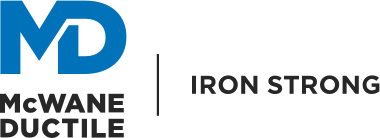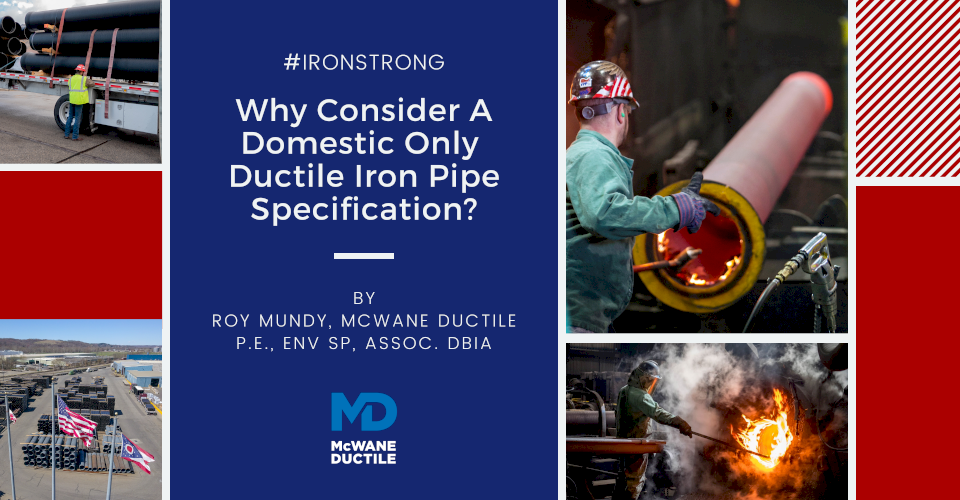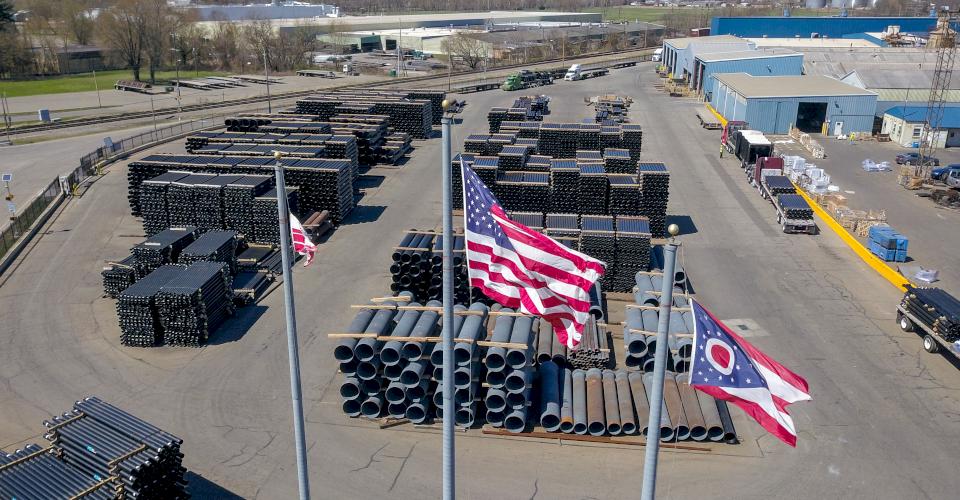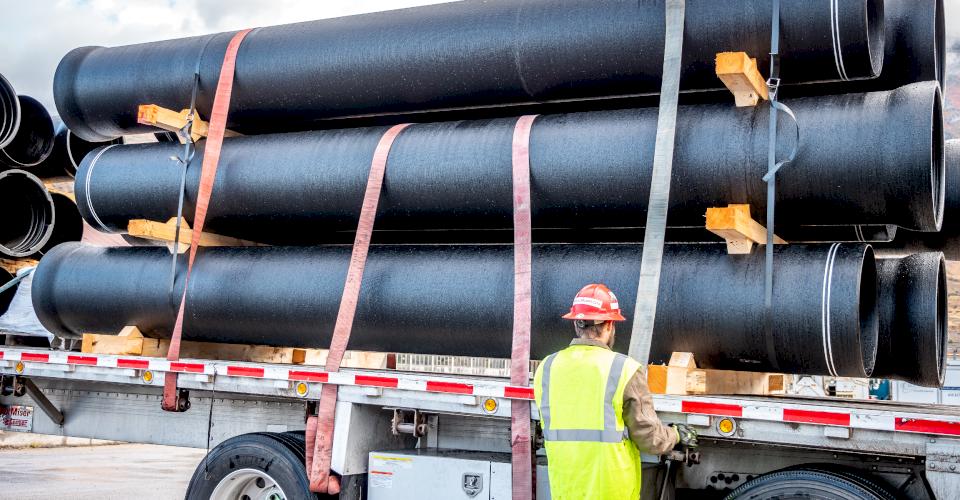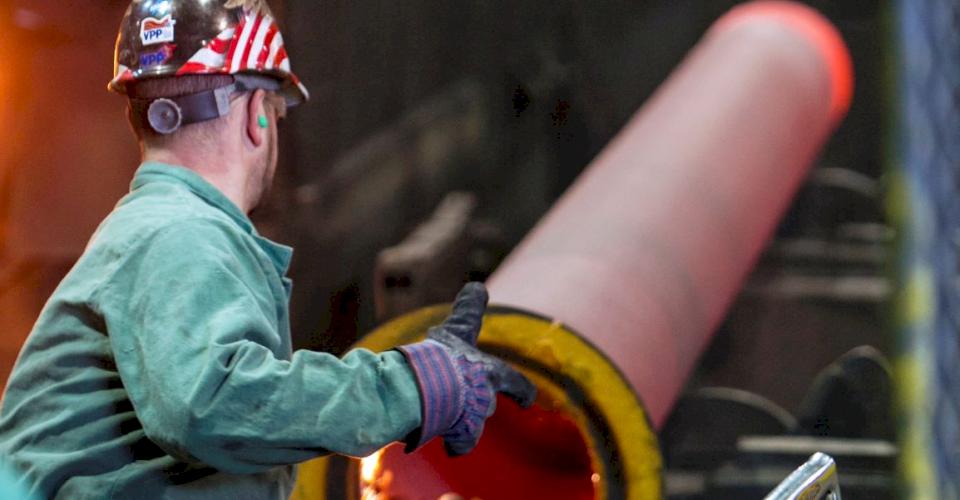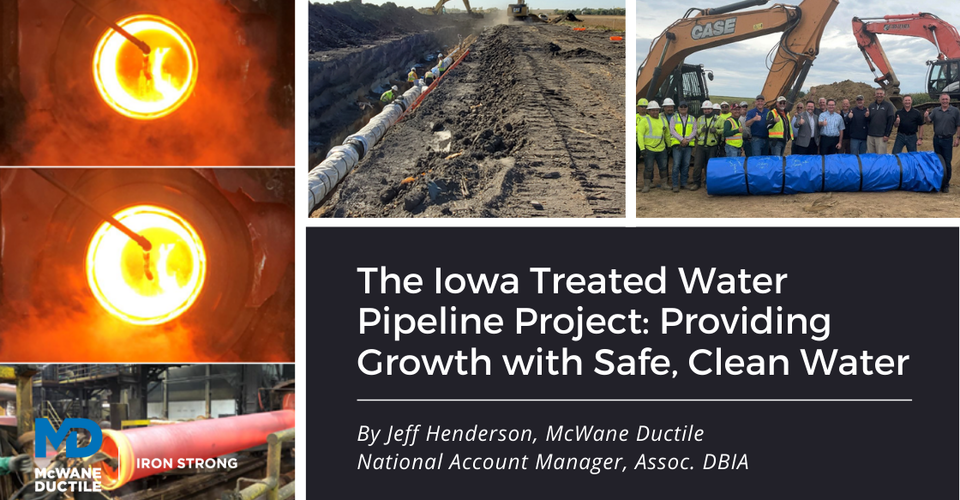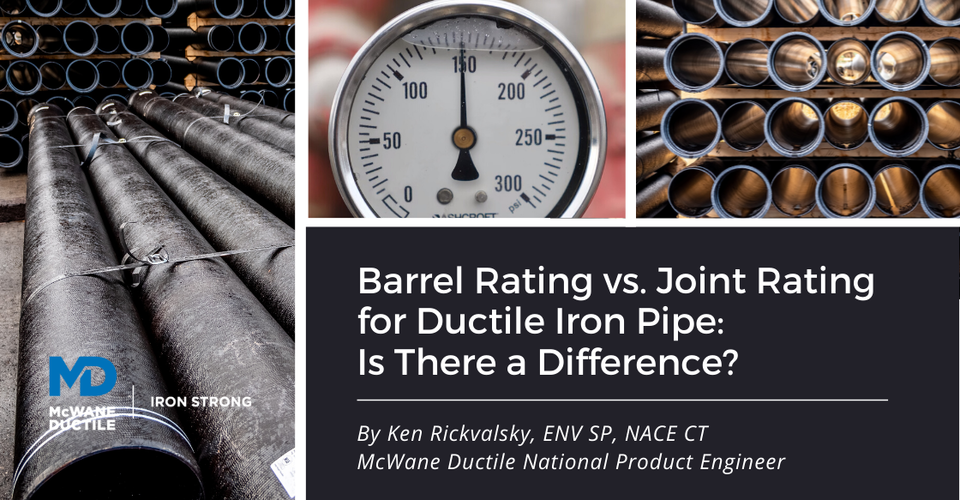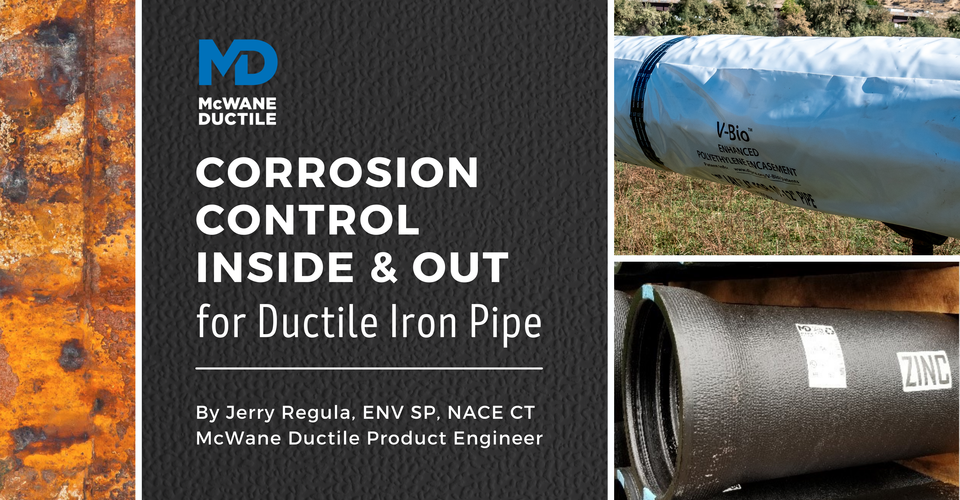Over the years, products manufactured in our country have enhanced our quality of life, and how the products are manufactured makes a difference. U.S. Ductile iron pipe (DI pipe) manufacturers follow stringent guidelines in the manufacture of their products. In this Iron Strong Blog, we will discuss why to consider a domestic only Ductile iron pipe specification.
Water and wastewater professionals have developed methodologies and testing requirements that are outlined in AWWA/ANSI standards for DI pipe regarding its manufacture, required capability, testing, design, and ultimate use. Additionally, the American facilities that produce DI pipe must comply with standards such as those provided by the U.S. Environmental Protection Agency. All these factors can be found only with domestically produced DI pipe. This article details key attributes found only with installing domestically manufactured DI pipe.
Quality Assurance
Domestically produced DI pipe is manufactured in accord with AWWA/ANSI C151 Standard. Additionally, agencies such as the National Sanitation Foundation (NSF) and Underwriters Laboratories (U.L.) provide third-party, independent testing to ensure a quality manufacturing process and final product.
Some of the internal quality testings include:
- Base and ductile chemistry,
- Charpy tests, which determines impact resistance,
- Tensile tests confirming flexibility and strength,
- Visual inspection from bell to spigot,
- Gauged inspections confirming critical measurements,
- Visual inspections and measures to ensure proper cement lining and paint quality,
- All consummated by EACH joint of pipe being pressure tested at 500 psi before shipment to the customer.
Additionally, mill certs are used to track each pipe through the manufacturing process and certify that it meets or exceeds all required quality standards. This rigorous quality assurance has allowed DI pipe to serve many communities across our country for decades. Learn more about this by viewing another Iron Strong vlog, "What Are Mill Certs and Why Are They Needed?" by my colleague Ken Rickvalsky.
Conversely, DI pipe manufactured in other countries does not guarantee material quality with these standards, as factories are regulated by other governments that may not have the same quality measures in place, causing ambiguity regarding material quality and production. The DI pipe industry encourages clients to tour manufacturing facilities to see quality control and testing measures firsthand.
Transporting non-domestic DI pipe across thousands of miles, likely in a saltwater environment, can be detrimental to pipe. In addition to corrosion, which can cause many application problems, high salt content in Portland cement with relatively hard water could cause degradation and failure of cement linings.
Who Are You Going to Call?
During the design, construction, testing, and operation of a pipeline project, having access to professionals to provide expertise is critical. McWane Ductile is a partner that provides:
- Registered Professional Engineers
- NACE Certified Technicians
- ENVISION Sustainability Professionals
- Associate Design-Build Institute of America Professionals
Our team members have varied and lengthy backgrounds in utility operation, consulting services, plant operations, and field services. This personal service is not readily available with non-domestic entities. Having support services when and where pipelines are being installed is vital to successful pipeline installation.
In addition, domestic DI pipe manufacturers have testing facilities to evaluate quality aspects of the product, which are also frequently used to conduct forensic exams of material. Choosing a domestic manufacturer provides an efficient and economic resource with a transparent operation, which is not the case with facilities located outside our country. To learn more about the research and testing performed on domestically manufactured DI pipe, see this informative Iron Strong vlog, by my colleague, Jerry Regula.
Environmental Considerations
Domestic DI pipe is made by recycling steel scrap, preventing several thousand tons of scrap per week from being dumped in landfills and diverting one million tons of waste from landfills each year. Foreign DI pipe is most likely produced in a blast furnace operation from iron ore, which requires the mining, transportation, extraction, and processing of virgin minerals at a significantly greater cost to the environment. For more information on the recycled content of DI pipe, see this Iron Strong Blog by my colleague, Stuart Liddell.
All American DI pipe manufacturing facilities comply with stringent EPA and Occupational Safety and Health Administration (OSHA) standards, which protect both the environment and worker safety. Foreign DI pipe manufacturers do not have these same standards. Studies have shown that domestic DI pipe producers are more energy-efficient, and produce significantly less air pollution, carbon emissions, and greenhouse gases than foreign manufacturers. In addition, local, domestic production further reduces carbon emissions by eliminating the need to transport the pipe over thousands of miles of ocean.
Economic Impacts
Domestic DI pipe manufacturers employ thousands of people in numerous communities throughout the U.S. and Canada. Employees are provided healthy, good quality jobs, but ultimately these wages benefit respective economies both locally and nationwide. According to the Economic Policy Institute, for every 100 iron and steel mill manufacturing jobs, 923.7 indirect jobs are created. An example of this small business support is the scrap recycling business, where an average of 50 people are employed at each facility. This domestic DI pipe manufacturing component enhances the environment by using recycled goods and adds to our country's economic prosperity.
Additionally, the immediate availability of technical assistance and support allows for efficiently designed and constructed projects that benefit the utility's and, ultimately, the customer's bottom line. The purchase of non-domestic products cannot replicate these intrinsic advantages of domestic DI pipe.
Supply-Chain Security
When constructing water and wastewater pipelines, time is money. When a contractor must cease or slow work, added compensation for delay is usually in the conversation. Often, unknown conditions in the field require adjustments that can only be made by the efficient supply of materials suited for that scenario.
Also, materials will, from time to time, have defects. When this occurs, an immediate forensic determination needs to occur, and the product's replacement needs to be expeditious to get the contractor back to work. Trying to access replacement or specialty products from thousands of miles away can create delays and expenses.
What happens when a domestic DI pipe manufacturing plant ceases production because of natural disasters, a pandemic, work stoppage, or other factors? Logistics are in place to guarantee a seamless supply chain of domestically produced DI pipe. This network of resources does not exist when looking at the use of foreign DI pipe.
Total Project Solutions
Domestically produced DI pipe offers total pipeline solutions, including restrained joints, river crossing pipe, and applicable appurtenances. These offerings eliminate non-compatibility issues with manufacturing facilities and technical assistance close by to resolve field-related issues quickly without inordinate delays.
Why Domestic-Only Ductile Iron Pipe?
Leaders in our country have recognized the value of purchasing domestically- made iron and steel, as demonstrated by the American Iron and Steel Act. Domestic production promotes economic growth in our country while taking advantage of high-quality products and the environmental benefits of American-made iron and steel products. Specifications that allow foreign pipe can result in the use of inferior quality foreign products, with little or no service support, that cause significantly greater harm to the environment.
As we've discussed, there are compelling reasons to utilize American-made Ductile iron pipe. I encourage you to check out our Iron Strong Insights Magazine's upcoming issues and our Iron Strong Blog as we will delve deeper into this topic over the next several months.
If you have any questions or need further assistance with anything DI pipe related, please contact your local McWane Ductile sales representative. We have team members who have managed small and large water utility systems, served in engineering consulting firms, and bring decades of experience in solving field issues involving pipeline construction and operation. From design to submittal to installation, we strive to provide education and assistance to water professionals throughout the water and wastewater industry.
